Avoid infecting your device with malware via fake "Proforma" emails
Phishing/ScamAlso Known As: Proforma spam
Get free scan and check if your device is infected.
Remove it nowTo use full-featured product, you have to purchase a license for Combo Cleaner. Seven days free trial available. Combo Cleaner is owned and operated by RCS LT, the parent company of PCRisk.com.
What is "Proforma Email Virus"?
"Proforma Email Virus" is a spam email campaign used to proliferate a high-risk trojan called LokiBot. Cyber criminals send deceptive emails to thousands of users. The emails contain messages encouraging users to open an attached file - this results in infiltration of the LokiBot virus.
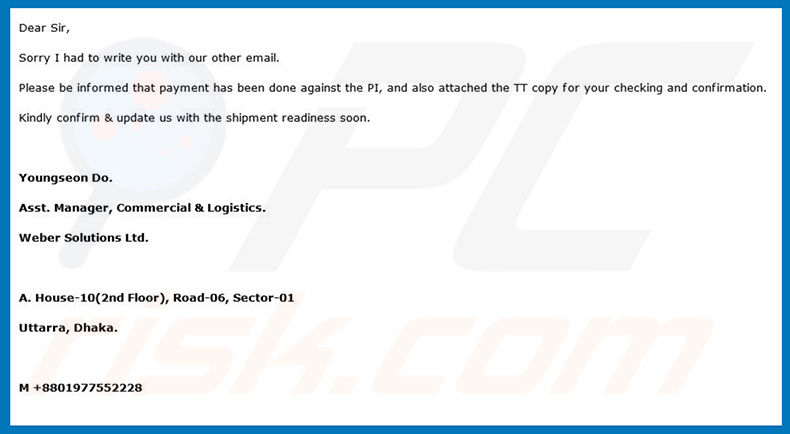
"Proforma Email Virus" overview
The email is presented as a notification of a payment and contains a number of attachments: malicious executables presented as invoices in PDF format. Users are urged to open them and read the information within, however, this simply executes LokiBot malware. Note that criminals sign the message as an assistant manager from Weber Solutions Ltd.
This is an attempt to give the impression of legitimacy. In this way, criminals significantly increase the number of infections, since users are much more likely to open attachments received from known companies. LokiBot also records sensitive data including saved logins, passwords, and keystrokes.
Cyber criminals aim to generate as much revenue as possible and information such as account credentials is valuable. There is a high probability that criminals will gain access to victims' bank, social network, and other accounts. They then misuse these through online purchases, money transfers, borrowing money from friends on social networks, and so on.
Therefore, the presence of trojans such as LokiBot can lead to serious privacy issues or even identity theft. If you have already opened attachments from the "Proforma Email Virus" email campaign, immediately scan the system with a reputable anti-virus/anti-spyware suite and eliminate all detected threats.
| Name | Proforma spam |
| Threat Type | Trojan, Password stealing virus, Banking malware, Spyware |
| Symptoms | Trojans are designed to stealthily infiltrate victim's computer and remain silent thus no particular symptoms are clearly visible on an infected machine. |
| Distribution methods | Infected email attachments, malicious online advertisements, social engineering, software cracks. |
| Damage | Stolen banking information, passwords, identity theft, victim's computer added to a botnet. |
| Malware Removal (Windows) |
To eliminate possible malware infections, scan your computer with legitimate antivirus software. Our security researchers recommend using Combo Cleaner. Download Combo CleanerTo use full-featured product, you have to purchase a license for Combo Cleaner. 7 days free trial available. Combo Cleaner is owned and operated by RCS LT, the parent company of PCRisk.com. |
Examples of malware spread by spam campaigns
There are many viruses distributed using spam campaigns including Adwind, FormBook, TrickBot, Emotet, and Hancitor. The developers of these viruses are different and, thus, their behavior might also differ slightly (some record data, others cause chain infections, etc.), however, all pose a significant threat to your privacy and computer safety. Therefore, you should eliminate these threats immediately.
How did "Proforma Email Virus" infect my computer?
As mentioned above, the "Proforma Email Virus" campaign is used to proliferate malicious attachments. The files are presented as PDF documents (called ********.PDF.r00 and ********.pdf.exe). This is done to trick unsuspecting users into opening the files. They are in fact malicious executables that, once opened, trigger the infection.
Note, however, that users must run the executable manually. Therefore, lack of knowledge of these threats and careless behavior are the main reasons for computer infections.
How to avoid installation of malware?
To prevent this situation, be very cautious when browsing the internet. Think twice before opening email attachments. If the file/link is irrelevant or has been received from a suspicious/unrecognizable email address, do not open the attachments. Have a reputable anti-virus/anti-spyware suite installed and running at all times.
These tools can detect and eliminate malware before any damage is done. Remember: the key to safety is caution. If you have already opened a "Proforma Email Virus" attachment, we recommend running a scan with Combo Cleaner Antivirus for Windows to automatically eliminate infiltrated malware.
Text presented in "Proforma Email Virus" email message:
Dear Sir,
Sorry I had to write you with our other email.
Please be informed that payment has been done against the PI, and also attached the TT copy for your checking and confirmation.
Kindly confirm & update us with the shipment readiness soon.
Youngseon Do.
Asst. Manager, Commercial & Logistics.
Weber Solutions Ltd.
A. House-10(2nd Floor), Road-06, Sector-01
Uttarra, Dhaka.
M +8801977552228
LokiBot malware process ("Payment Copy.PDF (~212KB).exe") in Windows Task Manager:
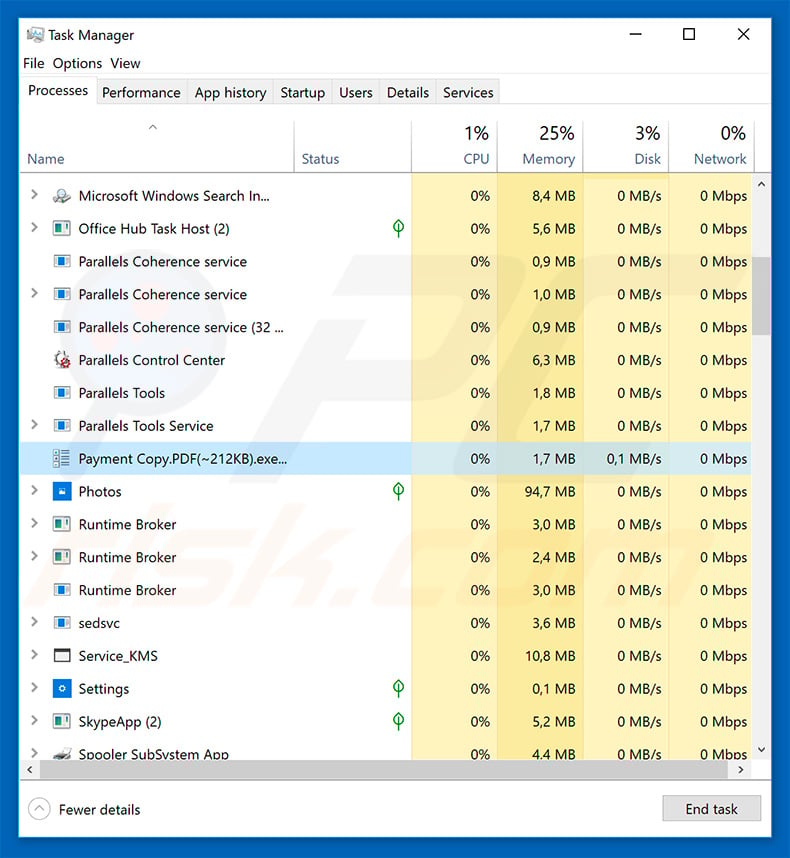
Another variant of "Proforma Email Virus" email message (also distributes LokiBot malware):
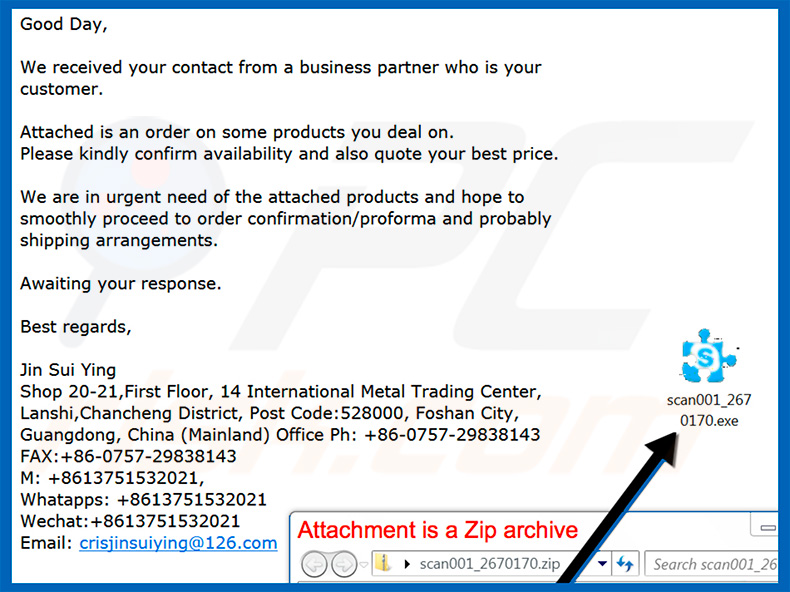
Text presented within this email:
Subject: PURCHASE ORDER/PROFORMA-26-11-08
Good Day,
We received your contact from a business partner who is your customer.
Attached is an order on some products you deal on.
Please kindly confirm availability and also quote your best price.
We are in urgent need of the attached products and hope to smoothly proceed to order confirmation/proforma and probably shipping arrangements.
Awaiting your response.
Best regards,
Jin Sui Ying
Shop 20-21,FirstFloor, 14 International Metal Trading Center,
Lanshi,Chancheng District, Post Code:528000, Foshan City,
Guangdong, China (Mainland) Office Ph: +86-0757-29838143
FAX:+86-0757-29838143
M: +8613751532021,
Whatapps: +8613751532021
Wechat:+8613751532021
Email: crisjinsuiying@126.com
LokiBot malware process ("Inapperceptible (32 bit)") in Windows Task Manager:
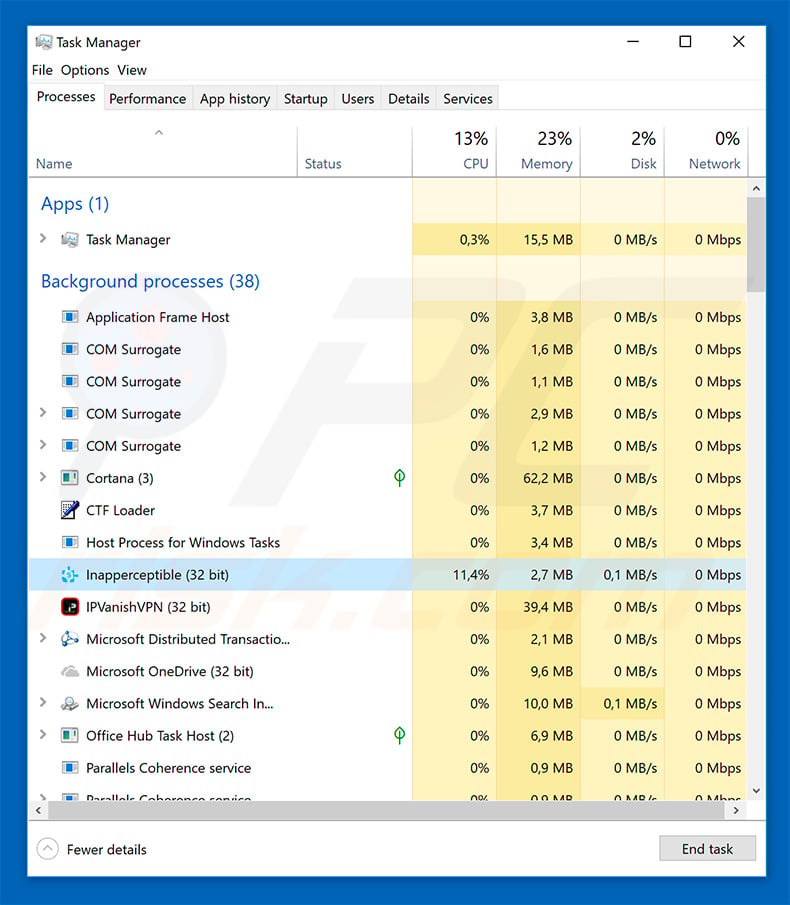
Another "Proforma Email Virus" variant used to spread FormBook trojan:
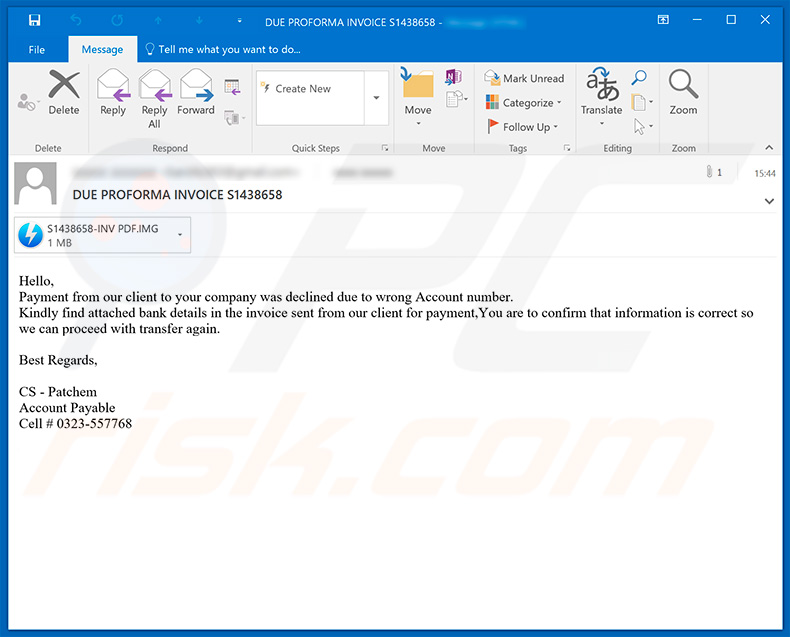
Text presented within this email:
Subject: DUE PROFORMA INVOICE S1438658
Attachment: S1438658-INV PDF.IMG
Hello,
Payment from our client to your company was declined due to wrong Account number.
Kindly find attached bank details in the invoice sent from our client for payment,You are to confirm that information is correct so we can proceed with transfer again.Best Regards,
CS - Patchem
Account Payable
Cell # 0323-557768
Another variant of "Proforma Email Virus" distributing Remcos RAT:
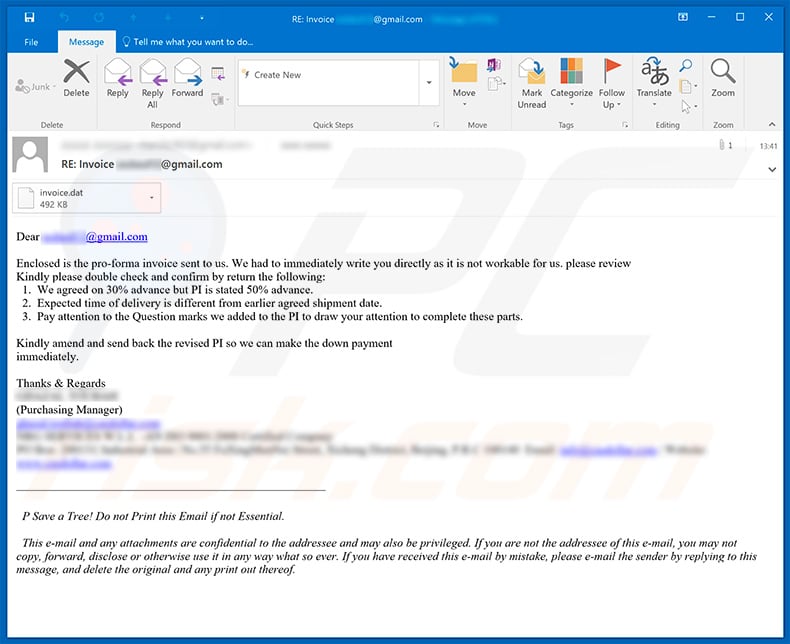
Text presented within this email:
Subject: RE: Invoice [recipient's_email]
Attachment: Invoice.dat
Dear [recipient's_email]
Enclosed is the pro-forma invoice sent to us. We had to immediately write you directly as it is not workable for us. please review
Kindly please double check and confirm by return the following:
1. We agreed on 30% advance but PI is stated 50% advance.
2. Expected time of delivery is different from earlier agreed shipment date.
3. Pay attention to the Question marks we added to the PI to draw your attention to complete these parts.Kindly amend and send back the revised PI so we can make the down payment
immediately.
Thanks & Regards
*****
(Purchasing Manager)
*****
**********
*****——————————————————————————
P Save a Tree! Do not Print this Email if not Essential.
This e-mail and any attachments are confidential to the addressee and may also be privileged. If you are not the addressee of this e-mail, you may not copy, forward, disclose or otherwise use it in any way what so ever. If you have received this e-mail by mistake, please e-mail the sender by replying to this message, and delete the original and any print out thereof.
Another variant of Proforma-themed spam email used to spread malware (njRat):
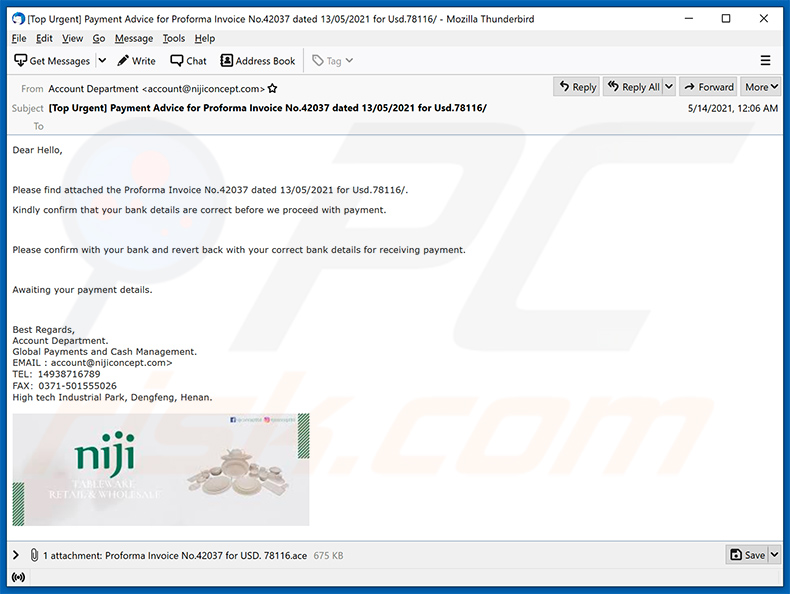
Text presented within:
Subject: [Top Urgent] Payment Advice for Proforma Invoice No.42037 dated 13/05/2021 for Usd.78116/
Dear ********,
Please find attached the Proforma Invoice No.42037 dated 13/05/2021 for Usd.78116/.
Kindly confirm that your bank details are correct before we proceed with payment.
Please confirm with your bank and revert back with your correct bank details for receiving payment.
Awaiting your payment details.
Best Regards,
Account Department.
Global Payments and Cash Management.
EMAIL : account@nijiconcept.com>
TEL:14938716789
FAX:0371-501555026
High tech Industrial Park, Dengfeng, Henan.
Yet another example of Proforma-themed spam email used to spread Formbook malware:
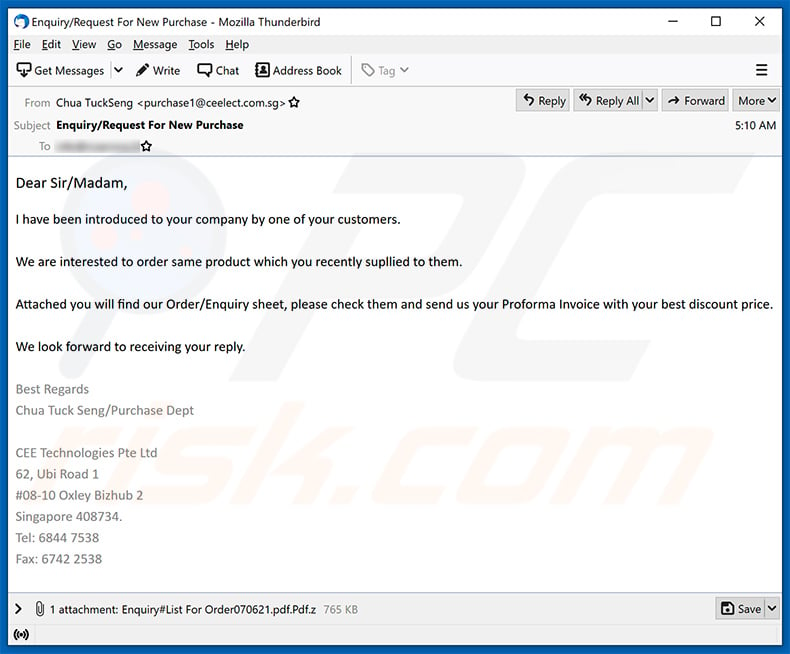
Text presented within:
Subject: Enquiry/Request For New Purchase
Dear Sir/Madam,
I have been introduced to your company by one of your customers.
We are interested to order same product which you recently supllied to them.
Attached you will find our Order/Enquiry sheet, please check them and send us your Proforma Invoice with your best discount price.
We look forward to receiving your reply.
Best Regards
Chua Tuck Seng/Purchase DeptCEE Technologies Pte Ltd
62, Ubi Road 1
#08-10 Oxley Bizhub 2
Singapore 408734.
Tel: 6844 7538
Fax: 6742 2538
Yet another example of Proforma Invoice-themed spam email used to spread FormBook malware:
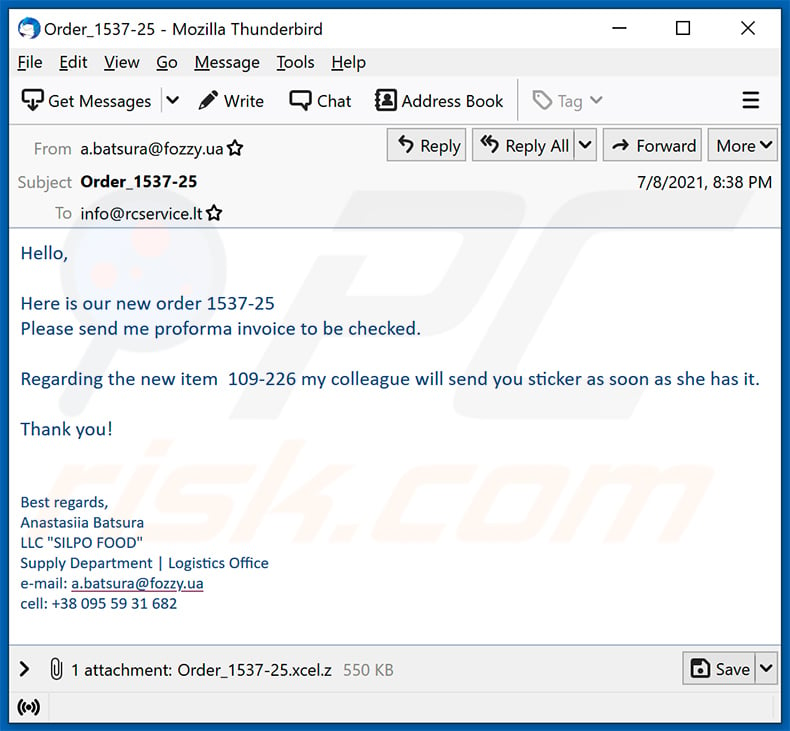
Text presented within:
Subject: Order_1537-25
Hello,
Here is our new order 1537-25
Please send me proforma invoice to be checked.
Regarding the new item 109-226 my colleague will send you sticker as soon as she has it.
Thank you!
Best regards,
Anastasiia Batsura
LLC "SILPO FOOD"
Supply Department | Logistics Office
e-mail: a.batsura@fozzy.ua
cell: +38 095 59 31 682
Screenshot of a proforma-themed spam email promoting a phishing site via attached HTML document:
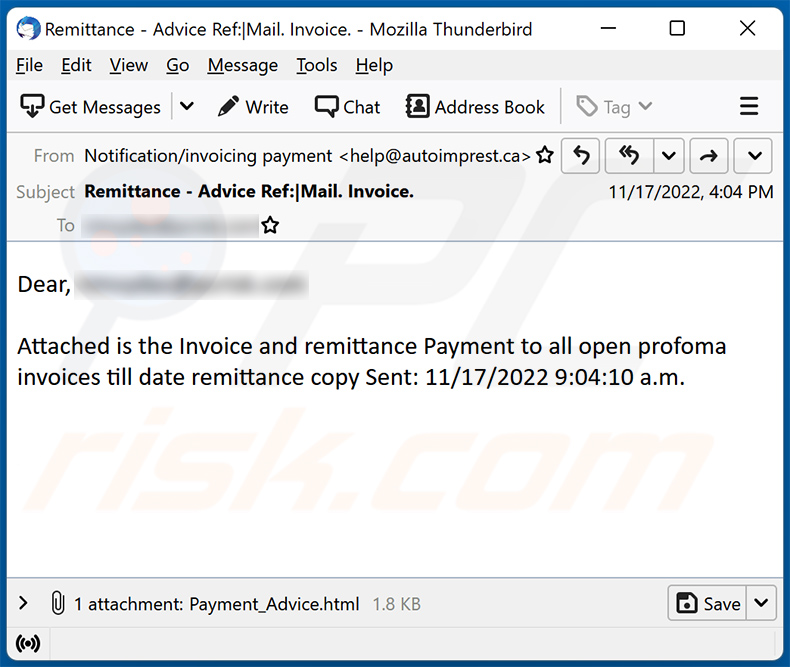
Text presented within:
Subject: Remittance - Advice Ref:|Mail. Invoice.
Dear, ********
Attached is the Invoice and remittance Payment to all open profoma invoices till date remittance copy Sent: 11/17/2022 9:04:10 a.m.
Screenshot of the promoted phishing site:
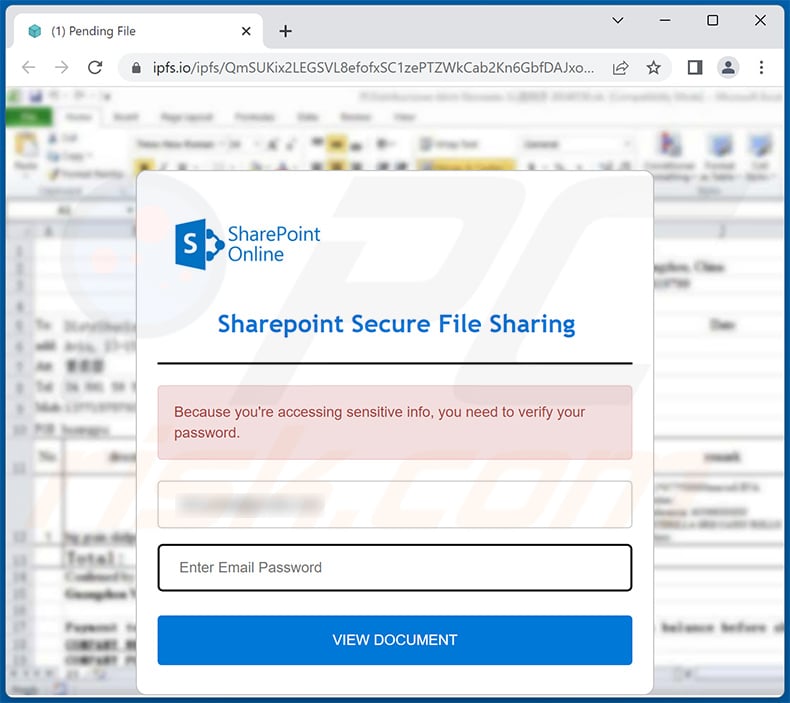
Instant automatic malware removal:
Manual threat removal might be a lengthy and complicated process that requires advanced IT skills. Combo Cleaner is a professional automatic malware removal tool that is recommended to get rid of malware. Download it by clicking the button below:
DOWNLOAD Combo CleanerBy downloading any software listed on this website you agree to our Privacy Policy and Terms of Use. To use full-featured product, you have to purchase a license for Combo Cleaner. 7 days free trial available. Combo Cleaner is owned and operated by RCS LT, the parent company of PCRisk.com.
Quick menu:
- What is Proforma spam?
- Types of malicious emails.
- How to spot a malicious email?
- What to do if you fell for an email scam?
Types of malicious emails:
![]() Phishing Emails
Phishing Emails
Most commonly, cybercriminals use deceptive emails to trick Internet users into giving away their sensitive private information, for example, login information for various online services, email accounts, or online banking information.
Such attacks are called phishing. In a phishing attack, cybercriminals usually send an email message with some popular service logo (for example, Microsoft, DHL, Amazon, Netflix), create urgency (wrong shipping address, expired password, etc.), and place a link which they hope their potential victims will click on.
After clicking the link presented in such email message, victims are redirected to a fake website that looks identical or extremely similar to the original one. Victims are then asked to enter their password, credit card details, or some other information that gets stolen by cybercriminals.
![]() Emails with Malicious Attachments
Emails with Malicious Attachments
Another popular attack vector is email spam with malicious attachments that infect users' computers with malware. Malicious attachments usually carry trojans that are capable of stealing passwords, banking information, and other sensitive information.
In such attacks, cybercriminals' main goal is to trick their potential victims into opening an infected email attachment. To achieve this goal, email messages usually talk about recently received invoices, faxes, or voice messages.
If a potential victim falls for the lure and opens the attachment, their computers get infected, and cybercriminals can collect a lot of sensitive information.
While it's a more complicated method to steal personal information (spam filters and antivirus programs usually detect such attempts), if successful, cybercriminals can get a much wider array of data and can collect information for a long period of time.
![]() Sextortion Emails
Sextortion Emails
This is a type of phishing. In this case, users receive an email claiming that a cybercriminal could access the webcam of the potential victim and has a video recording of one's masturbation.
To get rid of the video, victims are asked to pay a ransom (usually using Bitcoin or another cryptocurrency). Nevertheless, all of these claims are false - users who receive such emails should ignore and delete them.
How to spot a malicious email?
While cyber criminals try to make their lure emails look trustworthy, here are some things that you should look for when trying to spot a phishing email:
- Check the sender's ("from") email address: Hover your mouse over the "from" address and check if it's legitimate. For example, if you received an email from Microsoft, be sure to check if the email address is @microsoft.com and not something suspicious like @m1crosoft.com, @microsfot.com, @account-security-noreply.com, etc.
- Check for generic greetings: If the greeting in the email is "Dear user", "Dear @youremail.com", "Dear valued customer", this should raise suspiciousness. Most commonly, companies call you by your name. Lack of this information could signal a phishing attempt.
- Check the links in the email: Hover your mouse over the link presented in the email, if the link that appears seems suspicious, don't click it. For example, if you received an email from Microsoft and the link in the email shows that it will go to firebasestorage.googleapis.com/v0... you shouldn't trust it. It's best not to click any links in the emails but to visit the company website that sent you the email in the first place.
- Don't blindly trust email attachments: Most commonly, legitimate companies will ask you to log in to their website and to view any documents there; if you received an email with an attachment, it's a good idea to scan it with an antivirus application. Infected email attachments are a common attack vector used by cybercriminals.
To minimise the risk of opening phishing and malicious emails we recommend using Combo Cleaner Antivirus for Windows.
Example of a spam email:

What to do if you fell for an email scam?
- If you clicked on a link in a phishing email and entered your password - be sure to change your password as soon as possible. Usually, cybercriminals collect stolen credentials and then sell them to other groups that use them for malicious purposes. If you change your password in a timely manner, there's a chance that criminals won't have enough time to do any damage.
- If you entered your credit card information - contact your bank as soon as possible and explain the situation. There's a good chance that you will need to cancel your compromised credit card and get a new one.
- If you see any signs of identity theft - you should immediately contact the Federal Trade Commission. This institution will collect information about your situation and create a personal recovery plan.
- If you opened a malicious attachment - your computer is probably infected, you should scan it with a reputable antivirus application. For this purpose, we recommend using Combo Cleaner Antivirus for Windows.
- Help other Internet users - report phishing emails to Anti-Phishing Working Group, FBI’s Internet Crime Complaint Center, National Fraud Information Center and U.S. Department of Justice.
Frequently Asked Questions (FAQ)
Why did I receive this email?
Spam emails are not personal, even if they include details relevant to the recipient. This mail is distributed in mass-scale operations – therefore, thousands of users receive identical messages.
I have read a spam email but didn't open the attachment, is my computer infected?
No, merely opening an email is harmless. Devices are infected when malicious attachments or links are opened/clicked.
I have downloaded and opened a file attached to a spam email, is my computer infected?
If it was an executable (.exe, .run, etc.) – most likely, yes – since these files cause infections almost without fail. However, you might have avoided this if it was a document (.doc, .xls, .pdf, .one, etc.). These formats may require extra actions to jumpstart malware download/installation chains (e.g., enabling macro commands, clicking embedded content, etc.).
Will Combo Cleaner remove malware infections present in email attachments?
Yes, Combo Cleaner is capable of detecting and eliminating most of the known malware infections. Note that sophisticated malicious software usually hides deep within systems – therefore, running a full system scan is paramount.
Share:

Tomas Meskauskas
Expert security researcher, professional malware analyst
I am passionate about computer security and technology. I have an experience of over 10 years working in various companies related to computer technical issue solving and Internet security. I have been working as an author and editor for pcrisk.com since 2010. Follow me on Twitter and LinkedIn to stay informed about the latest online security threats.
PCrisk security portal is brought by a company RCS LT.
Joined forces of security researchers help educate computer users about the latest online security threats. More information about the company RCS LT.
Our malware removal guides are free. However, if you want to support us you can send us a donation.
DonatePCrisk security portal is brought by a company RCS LT.
Joined forces of security researchers help educate computer users about the latest online security threats. More information about the company RCS LT.
Our malware removal guides are free. However, if you want to support us you can send us a donation.
Donate
▼ Show Discussion